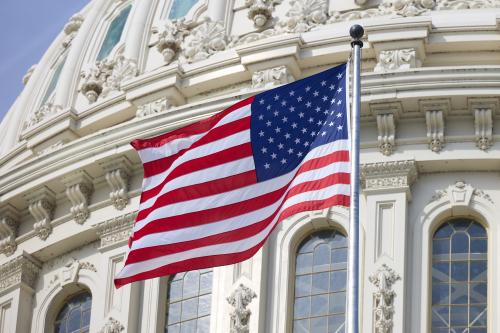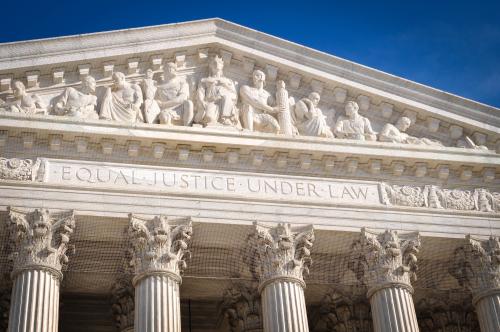Henry Aaron attended all three days of the Supreme Court’s hearings on the Patient Protection and Affordable Care Act and provided daily commentary on the Brookings Up Front blog.
Read Aaron’s account and analysis of the second day and third and final day of oral arguments.
The Supreme Court hearing room was full and abuzz. At least two cabinet officers were present, Kathleen Sebelius and Eric Holder. I was seated next to an appellate judge from one of the circuit courts and behind Zeke Emanuel.
The session began with the reading of two decisions.
The first, read by Antonin Scalia (because Roberts had recused himself) involved whether a two year statute of limitations, after which suits to recover funds from those who profited from insider trading were barred, had run or not. The court ruled that it had and sent the case back to lower courts for action, presumably dismissal.
The second involved a decision by the Department of State that an American citizen born in Jerusalem could not have his passport indicate that his country of birth was Israel. A law enacted by Congress and signed by the president, states that a citizen can have a passport with his country of birth listed correctly. The State Department, under presidents of both parties, has refused to enforce that law because to do so would interfere with the political issue of Jerusalem’s political status. Roberts reported that the Court has jurisdiction to settle such disputes and had decided that the law should be enforced. Breyer dissented.
Then, the proceedings turned to the Affordable Care Act. Does the Tax Anti-Injunction Act (TAIA) of 1867 bar litigation because the penalty/tax levied under the ACA on those who fail to carry adequate insurance has not yet actually been paid? That can’t happen until 2015. The TAIA says that no one can sue over a tax until they have paid the tax. The oral arguments were quite technical. As a non-lawyer, my understanding is, at best, approximate.
There are two questions. Is the penalty that people pay a tax? If the answer is “no,” there is no need to go to the next question. If the answer is “yes,” then the question is whether the TAIA flatly denies jurisdiction to federal courts until the tax is paid or, rather, bars federal jurisdiction unless the federal government waives its rights under the TAIA or the courts find that the particular case involves an exception to that law.
As it happens, both the plaintiffs (who allege that Affordable Care Act is unconstitutional) and the defendants (the government) hold that the TAIA does not apply. Because one appellate court decision held that it does, the Supreme Court hired an attorney to act as amicus and argue that the TAIA does apply. He led off. As is customary, he got a couple of sentences out and was then bombarded by questions from the various justices, Scalia in the lead. In general, the three women on the court were the most aggressive questioners. Of all the justices, Breyer, more than any other, tried to elevate discussion above the specifics of precedent and textual analysis to consider broad Congressional intent and public policy.
Next came the Solicitor General who argued that, for purposes of the TAIA, the penalty that people must pay if they fail to carry adequate insurance is not a tax. [He was twitted by one of the justices that briefs indicate that tomorrow he will be arguing that the penalty is a tax. The Solicitor General acknowledged that this is true and then, in terms I simply did not understand but that seemed sufficient to the court, argued that this was not an inconsistency and was just fine!!] Thus, he argued, the issue of whether the TAIA bars courts from considering the law now does not arise. [The term in dispute was whether the TAIA is “jurisdictional,” as the Constitution authorizes Congress to determine the jurisdiction of the federal courts. If the act is jurisdictional, then there is no discretion involved.] He indicated that the federal government has explicitly refused to waive the TAIA bar because it doesn’t need to do so to permit the case to proceed. This position apparently reflects a desire not to unduly dilute the limitations on litigation that TAIA provides.
The third attorney, representing the plaintiffs, reached the same final position. His presentation seemed to this non-lawyer-observer to be nervous and formalistic.
Much of the discussion involved an exploration of what a tax is. As it happens, there appears to be no definition of the word ‘tax’ in federal law! One line of questioning concerned whether the penalty/tax had any meaning apart from the mandate to carry insurance. The sharpest questioning came from Roberts. He asked, more or less: “We have a mandate. Carry insurance, or else. Or else what? If the penalty/tax is separate, then ‘or else?’ what? Or else ‘nothing.’” For reasons that are obscure to me, the plaintiffs’ attorney argued that it the penalty and the mandate are really separate and independent. The thrust of his questioning seemed to me to be that if the penalty/tax was really part and parcel of the mandate and enjoyed no separate life, then the court must face the constitutionality of the mandate however the tax/penalty is construed.
A related question was whether Congress had intended the penalty/tax to be construed as a tax, which led to microscopic, textual analysis of the Affordable Care Act. One section states that the penalty/tax shall be collected ‘in the manner of a tax.’ It is, in fact, to be withheld from tax refunds, but it cannot be collected from people who have no tax liability if they do not pay it voluntarily. Was that wording and various other passages sufficient to give the penalty enough ‘tax-ness’ to make it a tax? Probably not, I think, based on today’s questioning.
There was a foretaste of arguments that will take place on Wednesday concerning the constitutionality of the mandate on states to cover more people under Medicaid—those in new categories and those in previously eligible categories who had not applied for benefits but might do so now because of the mandate (even though most would have no income tax liability and hence no possible tax overpayments that could be withheld as a penalty/tax). These exchanges occurred near the end of the 90 minutes allotted to the jurisdictional issue and seemed to reflect in equal measure, exhaustion of the putative topic-of-the-day, what struck me as a rather weak and nervous performance by the plaintiffs’ attorney, and fatigue or pity on the part of the justices.



Commentary
What I Saw at the Supreme Court’s Hearing on the Health Care Law
March 26, 2012